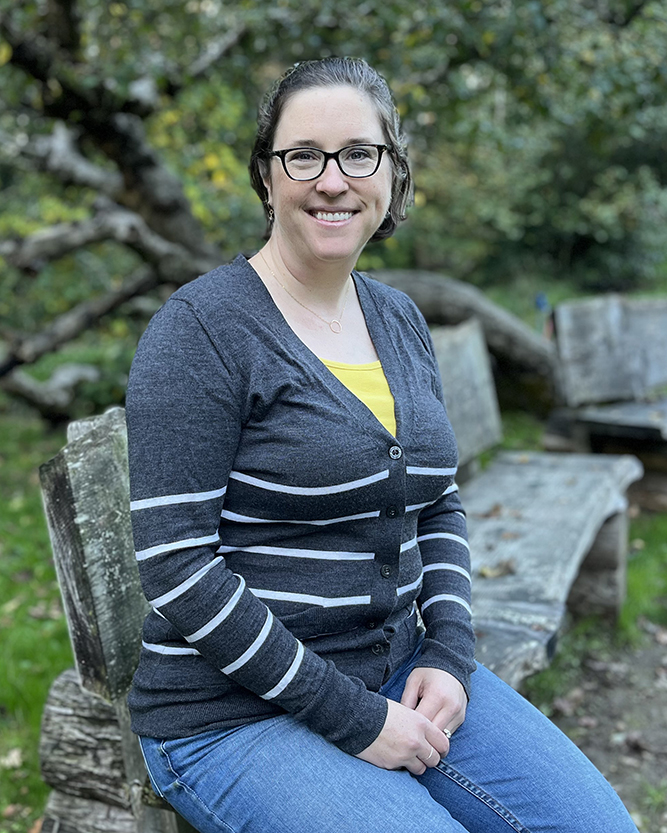Conversation with Amanda Nathan, Estate Planning Attorney
Amanda Nathan is a Bainbridge Island parent and a partner at the law firm Gordon Thomas Honeywell LLP, where her practice focuses on estate planning, probate, and trust administration. Born and raised in Tacoma, she moved to a home near Moritani Preserve in 2020 after living abroad in Belfast, Northern Ireland.
Since then, Amanda has leaned into her volunteer work with local parks and trails, recently as the chair of our Friends of Moritani Preserve Committee, as well as a co-founder of the Saturday morning Fort Ward parkrun.
Amanda sat down to talk with Bainbridge Island Parks & Trails Foundation staff about her perspective on charitable gifting as a component of estate planning, as well as her passion for parks, trails, and natural spaces.
What drew you to volunteer work in the parks and trails of Bainbridge Island?
When I lived in Northern Ireland, I was taking a pause from my legal career around the birth of my daughter. I volunteered as a Trails Ranger at the National Trust’s Mount Stewart estate, which features an incredible 800 acres of gardens, woodland, and farm fields. My work there focused both on conservation activities, such as wildlife monitoring, and on public engagement with the land through improvement and maintenance of trails and education about the local flora and fauna. When we chose our home on Bainbridge Island, it was in large part because of its proximity to Moritani Preserve and the walkability offered by the nearby trails. I love that my family can step out our door, hike along the Lost Valley trail, and end up at a friend’s house near Gazzam Lake. It’s one of the wonderful things about living in this community.
From what you have seen in your profession, what considerations might lead someone to include charitable giving in an estate plan?
We often frame it in terms of shaping your legacy. At one level, part of your legacy might be paving the way for your children or grandchildren to be able to pay for school, buy their first home, or start a business – essentially providing some financial security as they launch their careers and start a family of their own. Another aspect of estate planning is considering your legacy in your community. What is important to you as you look at your community? What can you do to improve the place you call home for your children and future generations? Legacy giving can have an incredible impact on the local environment, services, and community health.
There are also tax benefits to including charitable donations in an estate plan. Washington has a fairly low estate tax exemption (about $2.2 million per person in 2023), and although the Federal estate tax exemption is higher (about $12.9 million per person in 2023), it is set to decrease significantly in 2026. Washington and Federal estate tax can add up to a substantial tax liability for high-net-worth families. Including charitable gifts in your plan offers tax savings, helps pass more of your estate to your children with less estate tax paid, and directs some of your estate to the causes most important to you.
Do you have any wisdom to share with individuals considering including a charitable donation in their estate plan?
There are many ways to incorporate nonprofits like the Bainbridge Island Parks & Trails Foundation thoughtfully into your planning, for gifts both large and small. One local resource that provides inspiration for charitable planning is the Leave 10 organization, which encourages individuals to leave at least 10 percent of their estate to charity.
As a professional advisor, I encourage clients with charitable intent to lay the groundwork and start doing some charitable gifting during their lifetime. You can work directly with the nonprofit organization to identify what they need or how you can support them in bringing to life a specific initiative that interests you.
Lifetime gifts have the added benefit of a charitable deduction for income tax purposes (and, in certain circumstances, a deduction for Washington capital gains tax). There are several good and tax-efficient ways to give to charity, including qualified charitable distributions from retirement accounts, charitable trusts, and donor-advised funds. It’s worth exploring options with your estate planning attorney and financial advisor.



